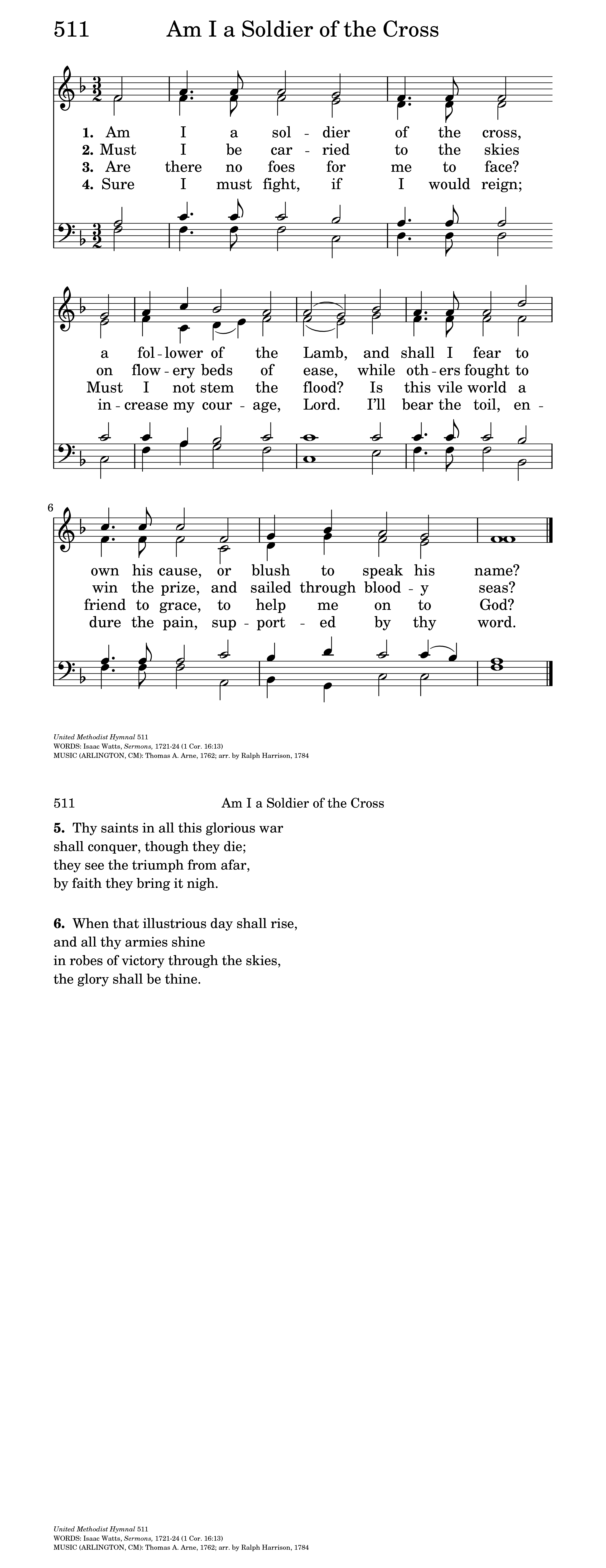a foll'wer of the Lamb,
and shall I fear to own His cause,
or blush to speak His name?
2. Must I be carried to the skies
on flow'ry beds of ease,
while others fought to win the prize,
and sailed thro' bloody seas?
3. Are there no foes for me to face?
Must I not stem the flood?
Is this vile world a friend to grace,
to help me on to God?
4. Sure I must fight, if I would reign;
increase my courage, Lord!
I'll bear the toil, endure the pain,
supported by Thy word.
5. The saints in all this glorious war
shall conquer, though they die;
they see the triumph from afar
by faith's discerning eye.
6. When that illustrious day shall rise,
and all Thine armies shine
in robes of vict'ry thro' the skies,
the glory shall be Thine.
Scripture;
Proverbs 29:25,
Isaiah 45:22, Mark 8:34-38,
Matthew 16:18
The hymn "Am I a Soldier of the Cross" was written by Dr. Isaac Watts, a prolific English Christian minister, theologian, and hymn writer, often referred to as the "Father of English Hymnody." It was first published in 1724 in his collection "Hymns and Spiritual Songs."
Background and Meaning
"Am I a Soldier of the Cross" is a reflective and challenging hymn, written to stir self-examination in Christians regarding their commitment to Jesus Christ and their willingness to endure hardship for their faith. The central metaphor of the hymn is that of a Christian as a soldier, drawing from military imagery found in 2 Timothy 2:3–4, Ephesians 6:10–18, and other scriptures that compare the Christian life to a battle or warfare against spiritual enemies.
Historical and Cultural Context
During the time Isaac Watts wrote this hymn, Christianity in England was under tension. Though there was no widespread persecution like in earlier centuries, Nonconformists (like Watts himself, who was not part of the Church of England) still faced discrimination and exclusion. Watts sought to remind believers that discipleship involves sacrifice—not just comfort or passive belief.
The Hymn’s Message
Each stanza is a rhetorical and deeply personal question aimed at challenging the believer’s resolve and sense of mission. For example:
Am I a soldier of the cross,
A follower of the Lamb,
And shall I fear to own His cause,
Or blush to speak His name?
Watts is not merely poetic; he’s echoing the New Testament’s call to bold witness, even in suffering. The hymn insists that true discipleship involves courage, endurance, and a willingness to "bear the toil, endure the pain, supported by Thy word."
Enduring Legacy
This hymn has been sung for centuries and remains popular in both Protestant hymnals and historical collections. Its directness and earnest tone have made it a favorite for times of revival, reflection, and commitment.



No comments:
Post a Comment